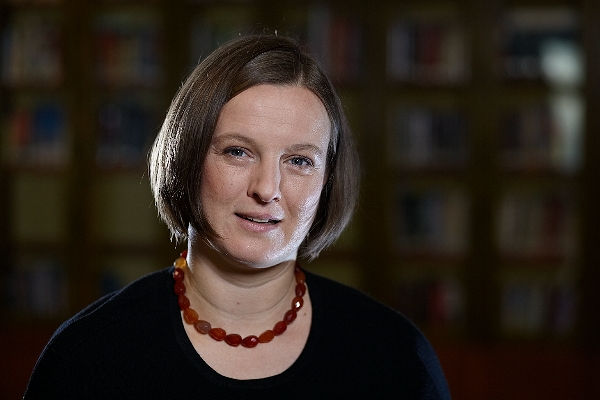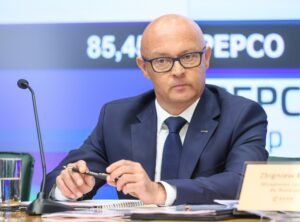„The lessons from Nord Stream 1 and 2 reveal that the history of our energy relations is full of controversy and taboo topics. We need a formula for talking about difficult issues, because they will always come up, as in the case of nuclear power,” Agata Łoskot-Strachota from the Center for Eastern Studies and Bruegel tells BiznesAlert.pl.
Agata Łoskot-Strachota and Georg Zachmann who have been commenting for BiznesAlert.pl for years, have published an article on energy cooperation between Poland and Germany in the Rzeczpospolita daily. We have interviewed Mrs. Strachota about their postulates.
BiznesAlert.pl: Is the EU aiming to become independed of raw materials from Russia?
Agata Łoskot-Strachota: First, it seems that the goal of abandoning Russian raw materials by 2027 included in the REPowerEU program is not binding and even evaporated from the latest documents, in which one can already read about the desire to minimize dependence by 2030. Secondly, this objective is not formally binding nor does it relate to the modalities of the country-by-country approach to it. Thirdly, the drop in the share of raw materials from Russia achieved by Europe is primarily the result of Russian actions. Gazprom for various reasons or without them limited supply. There are still a number of contracts with the Russians.
Is that a threat?
There is a possibility, a risk, that someday these supplies will be increased even despite the ongoing war. This is a worrying prospect, because it could strengthen Russia’s ability to put pressure on the EU and undermine its unity. The war continues, as can be clearly seen especially after the massive missile attack on Ukraine on December 29, but the real economic pressure of the West on Russia, its severity and effectiveness seems to be decreasing. It is necessary to consider how to change this, including how to limit the import of raw materials from Russia. Setting reduction targets seems like a good idea. Poland has long wanted this (minimizing supplies from Russia), Germany did not, but the war turned everything around. Perhaps this will be one of the areas showing that, despite previous differences and controversies, we can think alike and co-shape EU policy at the highest level.
Will we agree on nuclear energy?
The lessons from Nord Stream 1 and 2 reveal that the history of our energy relations is full of controversy and taboos. We need to rebuild mutual trust, and come up with a formula for talking about difficult topics, because they will always appear, as in the case of nuclear power. Trust must be restored and platforms for dialogue at different levels must be created. EU countries have autonomy in creating energy mixes.
What does that mean?
Recognizing this fact is a good starting point for cooperation talks in the electricity sector. Such an approach will facilitate talks on new capacities, including nuclear reactors, cross-border cooperation, technical cooperation and more. These topics will still be present in the debate, as can be seen from the differences on the nuclear power issue between France and Germany and the renaissance of interest in nuclear energy in the EU. The U.S. will continue to support the atom in Poland and other European countries and see nuclear power as a way to decarbonize and achieve climate goals. A difficult dialogue should not be avoided.
Will LNG from Poland ever reach Germany?
The post-war reorientation of directions and routes of gas supplies to Europe resulted in the launch or acceleration of many projects at once. There is a risk that in a few years the demand for gas in accordance with European plans will fall and we will be left with unnecessary infrastructure, with orphaned assets. This is a financial and environmental cost. On the other hand, we have a lot of infrastructure from the East standing idly. So we can look for synergies. Maybe we can make better use of what is, that is, the Yamal-Europe Gas Pipeline, which is almost empty?
Could the Yamal gas pipeline be used for LNG supplies?
Yes. It can be used by Poland to transfer imported liquefied gas to Germany almost without building new onshore infrastructure. Gaz-System considered building two FSRUs in Gdańsk, one of which was supposed to be used for selling gas to our negighbors, so why not Germany. Market research for the FSRU2 did not attract enough offers from Central Europe. Maybe it is worth going back to this topic and talk about it with Berlin? The Germans have undertaken many projects for new terminals, but many of them also caused environmental protests, so in some cases it may be easier for them to reach supplies from Poland.
Can we rebuild Ukraine together?
It is well known that the reconstruction of Ukraine is a priority. The war continues and winning it is the most important thing. There is a clear field for cooperation with Germany, and the second step is reconstruction. The more cooperation and coordination, the better the effect will be. We also hope for further integration of Ukraine with the European Union. It is already happening when it comes to energy thanks to Ukraine’s membership in the Energy Community and it harmonizing its regulations with European law. This process is heterogeneous. Coordination is insufficient and is evolving, or may evolve, into competition or a race between EU countries. It would therefore be in the Polish-German interest to cooperate again, to seek common interests, to have a trilateral conversation with Ukraine about solutions that are beneficial to all and at the same time accelerate integration and ultimately accession.
Is that possible?
These are difficult topics, but the war creates space for courageous actions and unity will serve Poland, Germany, the EU and Ukraine.
Interview by Wojciech Jakóbik









